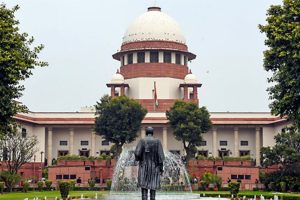Stating that there were areas in the Prohibition of Child Marriage Act 2006 (PCMA) that defeats the very purpose of law and needs to be addressed including child betrothals – engagement at childhood and marriage at different point in time – and the confusion over the precedence between PCMA and different personal laws, the Supreme Court on Friday suggested the parliament to consider outlawing child betrothals which may be used to evade penalty under the PCMA.
Issuing a slew of directions to curb the practice of child marriage which is still prevalent in many parts of the country, a bench comprising Chief Justice D.Y. Chandrachud, Justice J.B. Pardiwala and Justice Manoj Misra, in a judgment said, “Parliament may consider outlawing child betrothals which may be used to evade penalty under the PCMA”.
Advertisement
Urging the parliament to outlaw the child betrothal – engagement at childhood leading to marriage at a later point in time , Chief Justice Chandrachud speaking for the bench said, “we note that while the PCMA seeks to prohibit child marriages, it does not stipulate on betrothals. Marriages fixed in the minority of a child also have the effect of violating their rights to free choice, autonomy, agency and childhood. It takes away from them their choice of partner and life paths before they mature and form the ability to assert their agency. International law such as CEDAW (the Convention on the Elimination of All Forms of Discrimination Against Women 1975) stipulates against betrothals of minors.”
Holding their hands from making any judicial deceleration in plugging the gaps in the PCMA in the absence of a Constitutional challenge or a case being argued to that effect before it, the Chief Justice authorising the judgment said, “In the course of this judgment, we have traced the full breadth of the law against child marriage. The PCMA is the central legislation governing the issue on the subject. In light of the Constitutional guarantees accruing to children, we observe certain gaps in the PCMA.”
On the issue of PCMA having precedence over the different personal laws, the court noted that the parliament is already seized of the matter as 2021 proposed amendment to the Prohibition of Child Marriage Act 2006 is now before the Department Related Standing Committee on Education, Women, Children, Youth and Sports that expressly state the overriding effect of the statute over various personal laws.
The Prohibition of Child Marriage (Amending) Bill 2021 was introduced in Parliament on December 21, 2021.The court referred to the note that the Central government – the Ministry of Women & Child Development – had submitted after judgment was reserved and passing the buck on the court to take a call on PCMA having precedence over the personal laws.
Referring to the note which stated, “There are conflicting pronouncements by various High Courts about the precedence of the Prohibition of Child Marriage Act (PCMA), 2006 over the personal laws. Hence, the Hon’ble Court may consider issuing directions pronouncing that the PCMA will prevail over the personal laws governing marriage. …”
The judgment pronounced today noted that the details of the conflicting opinions by different High Courts were not furnished in the submissions by either party to these proceedings.
The slew of directions issued today included mandatory appointment by the States/UTs of the officers solely responsible for discharging the functions of CMPO at the district level, establishment of a Specialized Police Unit (SPUs), establishment of a Special Child Marriage Prohibition Unit (SCMPU), empowering magistrates to take suo motu action and issue preventive injunctions, exploration of special fast-track courts for child marriage cases and so on.
The court directed its registry to transmit a copy of the judgment to the Secretaries of all concerned central ministries including the Ministry of Home Affairs, Ministry of Women and Child Development, Ministry of Panchayati Raj, Ministry of Education, Ministry of Information and Broadcasting, Ministry of Rural Development, statutory authorities, institutions, and organizations under the control of the respective ministries.
It further directed the Ministry of Women and Child Development to circulate the judgment to the Chief Secretaries/Administrators of all the States and Union Territories, as well as NALSA, and NCCPR for strict compliance with the directions.











